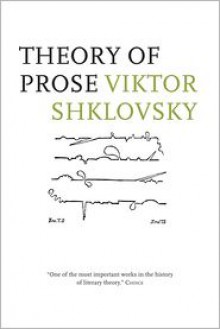Viktor Shklovsky's 1925 book Theory of Prose might have become the most important work of literary criticism in the twentieth century had not two obstacles barred its way: the crackdown by Soviet dictatorship on Shklovsky and other Russian Formalists in the 1930s, and the unavailability of an...
show more
Viktor Shklovsky's 1925 book Theory of Prose might have become the most important work of literary criticism in the twentieth century had not two obstacles barred its way: the crackdown by Soviet dictatorship on Shklovsky and other Russian Formalists in the 1930s, and the unavailability of an English translation. Now translated in its entirety for the first time, Theory of Prose not only anticipates structuralism and post-structuralism, but poses questions about the nature of fiction that are as provocative today as they were in the 1920s. Arguing that writers structure their materials according to artistic principles rather than from attempts to imitate "reality," Shklovsky uses Cervantes, Tolstoi, Sterne, Dickens, Bely, and Rozanov to give us a new way of thinking about fiction and, in his most impassioned moments, about the world. Benjamin Sher's lucid translation will allow Shklovsky's Theory of Prose to fulfill its destiny as a major theoretical work of the twentieth century. "A rambling, digressive stylist, Shklovsky throws off brilliant aperus on every page. . . . Sixty-five years after it first appeared, Theory of Prose remains an exciting book: Like an architect's blueprint, it lays bare the joists and studs that hold up the house of fiction." (Michael Dirda, Washington Post Book World 5-5-91) "This 1929 book by one of the founding fathers of Russian formalism is one of the most important works in the history of literary theory. . . . Shklovsky's enormously influential work is brilliant, provocative, and, by turn, elliptical and digressive. It is also whimsical and sometimes chaotic." (Choice) "[The] essays published in Theory of Prose reveal why Shklovsky might have become the most important literary theorist of our century, had history taken a different course." (Poetics Today) "Clearly there is a happy congruity between Shklovsky's insights and the modern consensus. His observations on various authors and
show less

